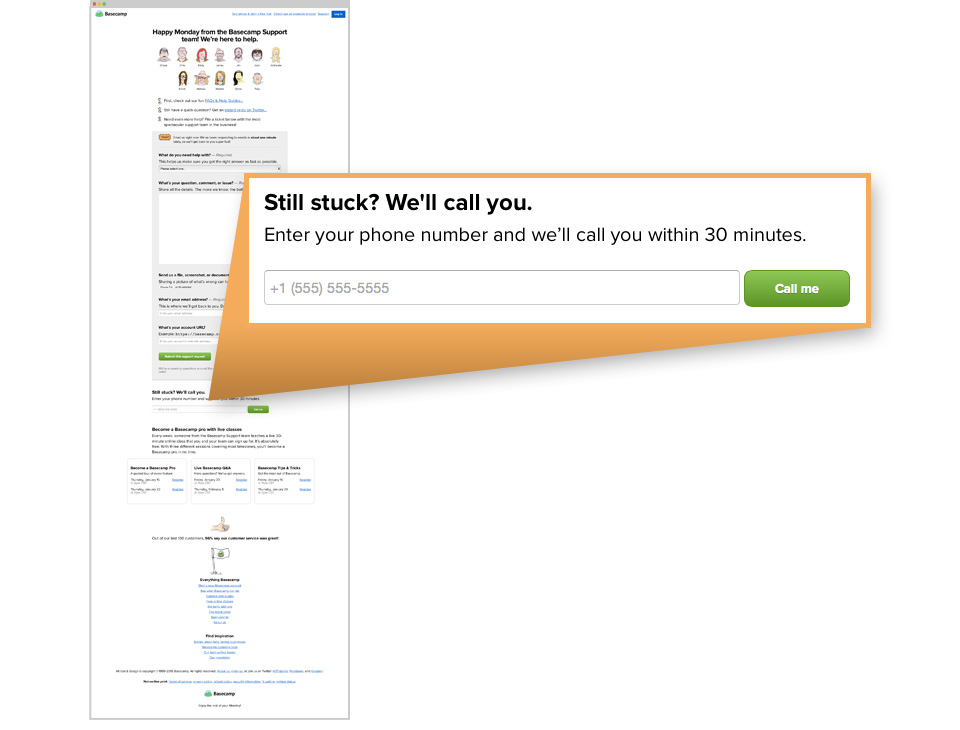It’s been a big year for our support team here at Basecamp, as Noah wrote last week. We’ve gone through lots of change and added several more people to the team.
Back in 2012, a few of us began working swing shifts to help clear the queue for the morning staff. Emily also started working Sundays to make Monday easier on the team and clear out some older cases from Friday night and Saturday. While the majority of our emails come in during traditional US business hours, we all know that work doesn’t necessarily happen between nine and five (for example, I’m writing this at 9pm PST). When we saw how well the Sunday and swing-shifts worked, we hired Jim to answer emails in Manchester, UK. That covered our butts from 2am-9pm CST, leaving only 5 hours of unanswered emails Monday through Friday. That doesn’t seem like a lot, but five hours can feel like an eternity if you’re locked out of your account or have a worrisome billing question. Shortly after we hired Jim, we decided to grow the team to include Natalie in Berlin and Chris, also in Manchester.
Fast forward six months to a few weeks after we launched our phone verification feature, when DHH was traveling and didn’t have cell reception on a Saturday. He was essentially locked out of his own app. Saturday, however, was the one day we didn’t have someone answering support emails. When DHH couldn’t log in to Basecamp on a Saturday in a timezone far from HQ, he felt the pain lots of our customers have felt. We decided to make a change to how support works.
I wanted to hire four new people to cover the world around, but DHH wanted me to hire no one and finagle the schedule with our existing staff [insert trollface here]. We settled on a compromise: If we hired four newbies, then we had to also implement phone support, such that we wouldn’t just have a big surge in employees (from 8 to 12: a 50% increase) without also expanding the scope of work. We opened four new positions: US Saturday-Wednesday, EU Saturday-Wednesday, Asia/Pacific Monday-Friday, and Asia/Pacific Saturday-Wednesday. While we searched for these four candidates, the existing team took turns trading one full day of work for a 4-hour Saturday shift. After an exhaustive search, we found our newbies: JorDanée in Florida, James in Berlin, Tony in Sydney, and Sylvia in Hong Kong.
Meanwhile, Noah, our self-described (and self-deprecating) Data Monkey, built a simple call-back platform for our Support page. We started slowly and worked through a lot of in-house anxiety and assumptions around phone support: people get angry, people interrupt, people express frustration more easily, people yell. At first, Noah and I were the only people taking calls, and the call option was only available to account owners and administrators. Then, the rest of the team joined us. We started opening the call-back option to more and more users. Now, any logged-in user has the option to request a call from us Monday through Friday from 5am until 5pm CST, with the occasional wee hour and weekend option. (For the record, our users are as sweet as freshly grated palm sugar and super happy that we call them back within a couple of minutes, so that in-house anxiety has mostly subsided.)

You can check out Noah’s comprehensive summary of the support stats here, but I’d like to point out some stats to celebrate. We made a huge dent in email-response times this year, with the median time to response across the entire year falling to three minutes. For comparison, back in 2011 and 2012 our median response time for email cases was over two hours. Additionally, we’re now answering emails on weekends within six minutes on average, whereas customers would wait upwards of eight hours for a response before 24/7 email was implemented. In our first year of phone support, we averaged about 250 calls per month despite having millions of customers. The median call-back time is under three minutes.
Not a call center.
Many of us have been working together for nearly four years now, so we’re a close-knit group of diverse weirdos. The major anxieties that cropped up during these proposed changes were based in the fear of culture shifts; we did not want to lose the senses of freedom or autonomy that come along with remote work, and growing the team 50% meant introducing more (potentially not weirdo) people to our existing, comfortable culture. Every time you introduce a new person to a culture, the culture shifts a bit. While we’re happy to include more people on our team, we also know that we want to remain relatively small.
The biggest cultural shift was with phone support. We were a team used to writing emails to customers all day, not speaking with them on the phone. We all identify as writers and introverts, so the idea that we’d have to speak to people on the phone felt icky. There were lots of “I was hired to write, not to speak” and “I’m not comfortable on the phone” and “I refuse to work at a call center.” Once everyone started taking calls, those anxieties wore away for most of the team. (I now compare talking on the phone with my days teaching university English: it’s all a performance.) Yet, we still had to navigate working with people in a new, real-time format. People are complicated. They do get mad, interrupt, and yell. Those calls are hard. They make us feel helpless in a position where we’re meant to be helpful. After a rough call or email, our team is still here to support each other. We encourage each other to debrief those rough interactions and step away from work for a few minutes.
Phone support also inhibits some freedoms of remote work. While many of us work from our homes, there are times when we get stir crazy and want to venture off to a coffeeshop to work. We all know that it’s rude to take calls at a coffeeshop, so we cover for each other if someone wants to get out of the house just like we would if someone were sick or on vacation or having an off-day. A huge part of working a customer support job is supporting each other, and we’re getting better and better at that with each new challenge we introduce to our workflow.
We may still be a small team, but our culture has grown significantly this year. From a Jiu-jitsu’ing cat lover in Oregon, to a working Paleo mom who likes to #liveriveted, to a car-obsessed deadlifting vegemite-eating Aussie – we know that our small team still means everyone knows each other, gets each other’s jokes, understands each other’s work ethics, and most of all, trusts each other wholeheartedly.

Paul
on 13 Jan 15This is a great post. Those stats are really impressive. Thanks or sharing!
Bartosz
on 14 Jan 15Did you ever think about implementing a live chat solution for your support needs?
Kristin Aardsma
on 14 Jan 15@Bartosz, we tried live chat (Olark) in the past for Basecamp Classic. We’ll definitely consider it down the road for the new Basecamp.
Katherine Raz
on 14 Jan 15I love this. When I worked at a SaaS startup, we originally created a loooooong onboarding series of emails that no one read. After reading an article somewhere on onboarding, we decided to switch it out to something simple: an email that basically said, “Thanks for signing up! Questions? Let me know when you’re available to talk by phone and we can get you started.”
This was terrifying at first, but after 3 phone calls, I realized customers were fairly easy to talk to. The added bonus: we learned SO MUCH about them and what they needed from our software. It was a priceless market research tool. (And we only really ended up on 5-10 calls per week.)
Kristin Aardsma
on 14 Jan 15@Katherine, thanks for sharing your experience! A personal touch goes a long way.
This discussion is closed.